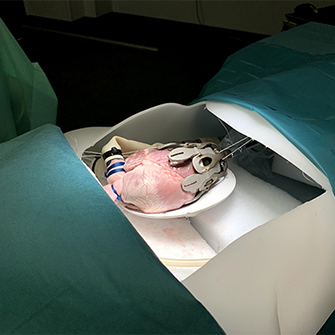
A multidisciplinary team of researchers from the Institut Jean Lamour - IJL (CNRS/University of Lorraine) and the Nancy School of Surgery, in association with the Nancy University Hospital and INSERM, is working on the development of the first biocompatible cardiac assistance device. A series of tests performed ex-vivo on animal hearts1 offers an alternative to heart transplantation for patients suffering from myocardial infarction. This work was published in Journal of the Mechanical Behavior of Biomedical Materials on April 15, 2021.
This work, carried out jointly by Jean-Philippe JEHL, Nguyen TRAN, Pablo MAUREIRA and Bruno LEVY, is being conducted within the framework of the European project ASCATIM (Cardiac Assistance for the Treatment of Myocardial Infarction). This three-year project has a budget of 1.18 million euros, two-thirds of which is funded by the European Regional Development Fund (FEDER).
The implantable medical device combines a 3D-printed motorized exoskeleton with titanium powder, designed by the School of Surgery and Nancy-based start-ups Velvet Innovative Technologies and HanaCorps, and a naturally occurring membrane developed at IJL. It will be placed minimally invasively around the failing heart to improve its contractile capabilities.
1 The use of rats and pigs for scientific purposes was authorized by the Ministry of Higher Education, Research and Innovation after a referral from the local ethics committee.
